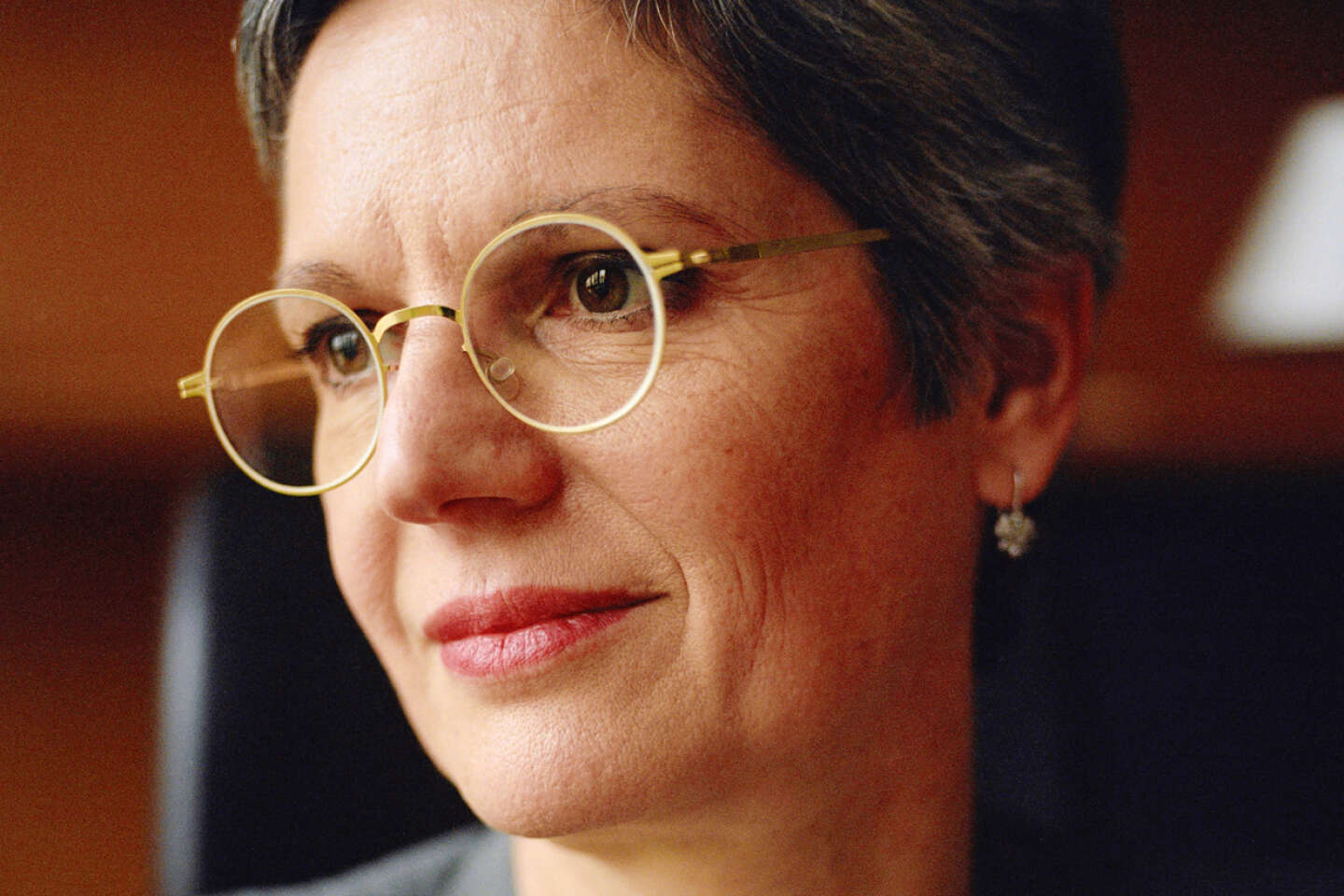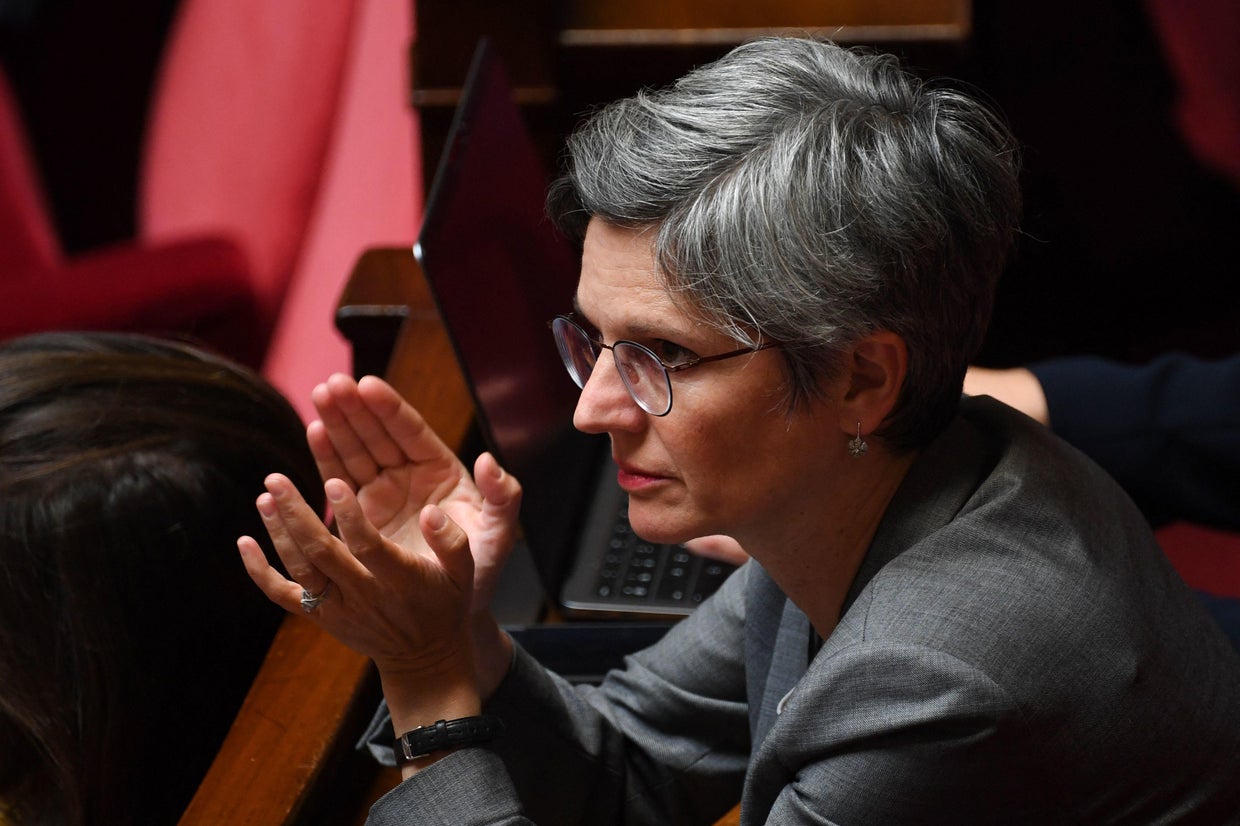Sandrine Rousseau: A Trailblazing Voice In French Politics
In the dynamic and often tumultuous landscape of French politics, few figures command as much attention and spark as much debate as Sandrine Rousseau. A prominent ecofeminist, economist, and politician, her journey from academia to the forefront of the Green movement has been marked by a relentless pursuit of social and environmental justice. Her bold stances and unwavering commitment to challenging established norms have made her a pivotal, albeit sometimes polarizing, voice, shaping contemporary discourse on climate, gender, and economic models.
This article delves into the life, career, and profound impact of Sandrine Rousseau, exploring the ideologies that drive her, the policies she advocates, and the influence she wields within and beyond the French political arena. Understanding her trajectory offers crucial insights into the evolving priorities of the European left and the growing urgency of ecological and feminist concerns in mainstream politics.
Biography: The Making of Sandrine Rousseau
Born on September 8, 1972, in Maisons-Alfort, France, Sandrine Rousseau’s intellectual curiosity and commitment to social issues were evident from an early age. Her academic background is rooted in economics, holding a Ph.D. in economics from the University of Lille 1. Before entering the political arena, she carved out a distinguished career as a university lecturer and researcher, specializing in environmental economics and corporate social responsibility. This academic foundation provided her with a deep understanding of the systemic issues she would later challenge in her political life.
Her early professional life was characterized by a blend of teaching, research, and engagement with various non-governmental organizations, particularly those focused on sustainable development and gender equality. This period allowed her to refine her analytical skills and develop a comprehensive perspective on the interconnectedness of environmental degradation, economic inequality, and social injustice. It was this holistic understanding that would later inform her unique brand of ecofeminism and her advocacy for radical systemic change.
Personal Data and Biodata: Sandrine Rousseau
| Attribute | Detail |
|---|---|
| Full Name | Sandrine Rousseau |
| Date of Birth | September 8, 1972 |
| Place of Birth | Maisons-Alfort, France |
| Nationality | French |
| Education | Ph.D. in Economics (University of Lille 1) |
| Profession | Economist, University Lecturer, Politician |
| Political Party | Europe Ecology – The Greens (EELV) |
| Current Role | Member of the National Assembly for Paris's 9th constituency |
| Key Ideologies | Ecofeminism, Degrowth, Social Justice, Climate Action |
A Journey into Politics: Sandrine Rousseau's Rise
Sandrine Rousseau’s transition into active politics was not sudden but rather a natural progression of her long-standing commitment to social and environmental causes. Her academic expertise provided a robust platform for her political aspirations, allowing her to articulate complex issues with clarity and authority. She joined Europe Ecology – The Greens (EELV), a party whose core values aligned perfectly with her own burgeoning ideologies.
Her political journey gained significant momentum when she was elected to the Regional Council of Nord-Pas-de-Calais (now Hauts-de-France) in 2010, where she served as Vice-President in charge of Research and Higher Education. This early experience in regional governance provided her with practical insights into policy implementation and the intricacies of political negotiation. It was during this period that she began to hone her public speaking skills and establish herself as a formidable voice within the Green movement.
Early Political Engagements
Beyond regional politics, Sandrine Rousseau actively participated in various internal party debates and national campaigns. She quickly became known for her uncompromising stance on issues such as climate change, gender equality, and economic justice. Her willingness to challenge the status quo and push for more radical solutions often set her apart from more moderate voices within her party and the broader political spectrum. This assertiveness, combined with her intellectual rigor, made her a figure to watch.
One of her most notable early engagements was her involvement in the "Me Too" movement in France, where she became a vocal advocate for victims of sexual harassment and assault. Her personal experiences and her public courage in addressing these sensitive issues resonated deeply with many, further solidifying her reputation as a fearless champion of justice. This period also highlighted her commitment to intersectional feminism, recognizing that social inequalities are often intertwined.
Core Ideologies: Ecofeminism and Degrowth
At the heart of Sandrine Rousseau's political philosophy lie two interconnected and powerful ideologies: ecofeminism and degrowth. These concepts are not merely academic theories for her; they are the foundational principles guiding her policy proposals and her vision for a more equitable and sustainable future. She argues that the exploitation of nature and the oppression of women stem from the same patriarchal, capitalist systems, and therefore, solutions must address both simultaneously.
Her advocacy for degrowth is particularly distinctive in mainstream politics. Unlike traditional economic models that prioritize continuous growth, Rousseau contends that infinite growth on a finite planet is an impossibility and a destructive pursuit. She proposes a societal shift towards a more localized, less consumerist, and more resource-efficient economy, emphasizing well-being over material accumulation. This radical rethinking of economic priorities challenges the very foundations of contemporary capitalism and has sparked considerable debate.
Ecofeminism: A Holistic Approach
For Sandrine Rousseau, ecofeminism is not just about environmental protection or women's rights in isolation; it is a holistic framework that recognizes the deep connections between environmental degradation and social injustice. She posits that the dominant patriarchal structures that exploit women also exploit the Earth, viewing both as resources to be controlled and consumed. Therefore, true ecological transition cannot occur without a parallel transformation in gender relations and power structures.
This perspective informs her approach to various policy areas, from agriculture and energy to labor and social welfare. She advocates for policies that empower marginalized communities, promote gender parity, and foster a more respectful relationship with the natural world. Her ecofeminist lens allows her to identify and challenge the underlying assumptions that perpetuate both environmental crises and social inequalities, making her a unique and compelling voice in the political discourse.
Key Policy Stances and Advocacy
Sandrine Rousseau’s political platform is comprehensive, covering a wide array of issues, but her most prominent advocacy revolves around climate action, social justice, and economic transformation. She consistently pushes for ambitious targets and systemic changes, often criticizing what she perceives as insufficient or superficial efforts from other political actors. Her policy proposals are typically bold, aiming for fundamental shifts rather than incremental adjustments.
On the economic front, beyond degrowth, she advocates for a re-evaluation of work, promoting concepts like a four-day work week and a universal basic income, arguing that these measures can contribute to both ecological transition and social well-being. She also champions wealth redistribution and stronger regulations on corporations to curb environmental damage and social exploitation. Her vision is one where economic activity serves the planet and its people, not the other way around.
Climate Action and Ecological Transition
Climate change is arguably the central pillar of Sandrine Rousseau’s political agenda. She views the ecological crisis as an existential threat requiring urgent and transformative action. Her proposals include a rapid phase-out of fossil fuels, massive investments in renewable energy, and a fundamental overhaul of agricultural practices to reduce carbon emissions and protect biodiversity. She often emphasizes the need for "ecological planning" – a top-down, coordinated effort to restructure the economy and society in line with environmental imperatives.
Furthermore, she stresses the social dimension of climate action, arguing that the transition must be just and equitable, not burdening the most vulnerable populations. This means ensuring access to green jobs, providing support for retraining, and designing policies that reduce energy poverty. For Sandrine Rousseau, climate action is inseparable from social justice, embodying her ecofeminist principles in practical policy terms.
Parliamentary Role and Legislative Efforts
In June 2022, Sandrine Rousseau achieved a significant milestone in her political career, being elected as a Member of the National Assembly for Paris's 9th constituency. This victory provided her with a national platform to push her agenda and participate directly in the legislative process. As an MP, she has been actively involved in parliamentary committees, particularly those related to sustainable development, gender equality, and economic affairs.
Her presence in the National Assembly has been marked by her characteristic assertiveness and her willingness to challenge established norms. She frequently uses her parliamentary interventions to highlight environmental injustices, advocate for feminist policies, and question the economic status quo. While her proposals are often seen as radical by some, they undeniably contribute to broadening the scope of political debate and pushing for more ambitious environmental and social reforms within the French parliament.
Public Image and Media Presence
Sandrine Rousseau possesses a powerful and distinctive public image, cultivated through her outspokenness, her intellectual rigor, and her unapologetic embrace of her core ideologies. She is a frequent guest on political talk shows, a prolific user of social media, and a regular subject of media commentary. Her direct communication style and her refusal to shy away from controversial topics ensure that she remains a highly visible figure in French public life.
Her media presence is characterized by a blend of academic precision and passionate advocacy. She is adept at translating complex economic and ecological concepts into accessible language, making her arguments resonate with a broader audience. However, her strong convictions and her tendency to challenge societal norms also make her a target for criticism, particularly from conservative media outlets and political opponents. This dynamic interplay between her compelling message and the reactions it provokes defines much of her public persona.
Navigating Controversy
No public figure with such strong convictions can avoid controversy, and Sandrine Rousseau is no exception. Her bold statements on issues like masculinity, degrowth, and the role of the state in personal lives have often sparked heated debates and drawn criticism. For instance, her comments on "deconstructing masculinity" or the need for men to "re-evaluate their relationship with work" have been met with both support and significant backlash.
Despite the controversies, Rousseau has consistently shown resilience and a refusal to back down from her positions. She views these debates not as obstacles but as opportunities to further articulate her vision and challenge ingrained societal biases. Her ability to navigate these contentious discussions, often with a blend of intellectual argument and personal conviction, is a testament to her political acumen and her unwavering commitment to her cause. These moments, while challenging, often serve to amplify her voice and bring her ideas to a wider audience, regardless of whether they agree or disagree with her.
Impact and Influence on French Society
The impact of Sandrine Rousseau on French society and politics is undeniable, even if her policy proposals have not always translated directly into legislation. Her primary influence lies in her ability to shift the Overton window – the range of ideas tolerated in public discourse – on critical issues. By consistently advocating for ecofeminist principles, degrowth, and radical social justice, she has pushed these concepts from the fringes into more mainstream political conversations.
She has galvanized a segment of the electorate, particularly younger voters and those deeply concerned about climate change and social inequality, who find resonance in her uncompromising stance. Her voice serves as a powerful reminder that alternative economic and social models are not only possible but necessary. Furthermore, her courage in speaking out on issues of sexual violence and gender-based discrimination has contributed significantly to the ongoing feminist movement in France, encouraging more open dialogue and accountability.
While she may not always win the immediate legislative battles, Sandrine Rousseau's persistent advocacy shapes the intellectual and moral landscape of French politics, forcing other parties and politicians to engage with the urgent questions she raises about sustainability, equality, and the future of society. Her influence is less about passing specific laws and more about changing the way people think and talk about fundamental societal challenges.
The Future of Sandrine Rousseau in Politics
As Sandrine Rousseau continues her tenure as a Member of the National Assembly, her future in French politics remains a subject of keen interest and speculation. Her distinctive voice and unwavering commitment to her core principles suggest that she will continue to be a significant force within the Green party and the broader political landscape. Her ability to articulate complex and often radical ideas with passion and clarity ensures her continued relevance.
The challenges she faces are considerable: translating her ambitious visions into concrete policy, building broader consensus for her more radical proposals, and navigating the inherent complexities of parliamentary politics. However, her track record suggests a politician who is not afraid to challenge the status quo, even if it means standing apart. As France and the world grapple with escalating climate crises, social inequalities, and economic uncertainties, the ideas championed by Sandrine Rousseau are likely to gain increasing traction, making her a figure whose trajectory will be closely watched in the years to come.
Her ongoing work will undoubtedly continue to push the boundaries of political discourse, advocating for a future that is more ecologically sound, socially just, and truly equitable for all. Whether through legislative victories, public debate, or simply by inspiring new generations of activists, Sandrine Rousseau is set to remain a vital and influential voice in the ongoing struggle for a sustainable and just world.
Sandrine Rousseau represents a powerful, often provocative, but undeniably essential voice in contemporary French politics. Her dedication to ecofeminism and degrowth offers a profound critique of existing systems and a bold vision for a different future. As we have explored, her journey from academia to the National Assembly has been driven by a consistent commitment to social and environmental justice, making her a figure whose influence extends far beyond the legislative chambers. Her willingness to confront difficult truths and challenge entrenched power structures ensures that she will continue to be a central figure in the ongoing debates about France's, and indeed the world's, path forward.
What are your thoughts on Sandrine Rousseau's political stances and her impact on French society? Share your perspectives in the comments below, or explore other articles on our site discussing prominent figures in European politics and environmental activism.

Sandrine Rousseau, whatever the cost - TIme News

Barbecue-bashing "eco-feminist" French politician Sandrine Rousseau

Sandrine Rousseau targeted by a complaint from a Parisian environmental